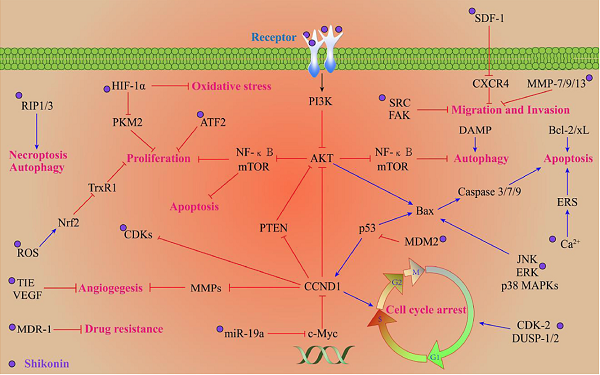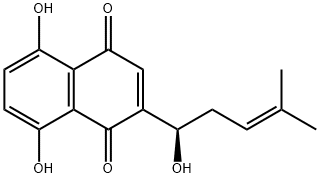The Anti-cancer activity of Shikonin
Shikonin, a naphthoquinone compound, is the main effective component of Arnebiae Radix, with antitumor, anti-inflammatory, antioxidant, and other pharmacological effect. Studies have shown that shikonin possesses significant antitumor activities against a variety of tumour cells, and it can inhibit the development of many cancers, such as breast cancer, lung cancer, liver cancer, cervical cancer, ovarian cancer, colon cancer, and prostate cancer.
The antitumor mechanism of shikonin is mainly related to multi-pathway and multi-target inhibition of tumour cell proliferation, the promotion of reactive oxygen species (ROS) production, induction of tumour cell apoptosis, cell cycle arrest, and tumour cell autophagy, and the inhibition of tumour cell migration and invasion. In addition, shikonin can increase the sensitivity of tumor cells to antitumor drugs and reverse the drug resistance of tumor cells. The signaling pathways involved in the antitumor effect of shikonin include phosphatidylinositol 3-kinase/protein kinase B (PI3K/Akt), PI3K/Akt/mammalian target of rapamycin (mTOR), mitogen-activated protein kinase (MAPK), pyruvate kinase M2/signal transducer and activator of transcription protein 3 (PKM2/STAT3), and Kelch-like epichlorohydrin-related protein 1/nuclear factor E2-related factor 2 (Keap1/Nrf2). The antitumor effects are mainly achieved by regulating the PI3K/Akt signaling pathway[1].

Several research studies have specifically studied the anti-cancer activity of Shikonin. It was documented that shikonin substantially inhibited the proliferation of MCF-7 and MDA-MB-435S cells and boosted apoptosis by cutting down mitochondrial membrane potential and raising the level of intracellular ROS. Equally important, shikonin markedly dampened the epithelial-mesenchymal transition (EMT), migration and invasion of human lung cancer cell lines A549 and H1299 in the inflammatory microenvironment induced by THP-1 cell conditioned medium. Pyruvate kinase M2 (PKM2) is a key enzyme involved in the aerobic glycolysis of malignant tumor cells. In refractory hepatocellular carcinoma cell lines HepG2 and HCCLM3, shikonin induced apoptosis via promoting the nuclear expression of PKM2 and HIF1 α while regulating the transcription and glycolysis of glycolysis-related genes. In triple negative breast cancer cells MDA-MB-231, shikonin drastically accelerated the autoubiquitination and degradation of cIAP1 and cIAP2, and then induced the reduction of the ubiquitination of RIP1 to restrain the activation of pro-survival signaling pathways. The miR-96 is a potential oncogene that is involved in the pathogenesis of gastric cancer (GC). The researcher reported that shikonin inhibited proliferation and colony formation via intervening miR-96/SOCS4 pathway in SGC-7901 cells, which provided a promising therapeutic target for GC. In addition, in terms of interfering with the metabolism of tumor cells, shikonin could also give rise to cell cycle arrest in G2/M phase by interfering with purine metabolism, amino acid metabolism and glycerophospholipid metabolism of tumor cells. Especially the disorder of purine metabolism may be the main mechanism of the shikonin-mediated antitumor effect. To summarize, shikonin is potentially a promising avenue for future cancer treatment.
References:
[1] QIANG SUN . Shikonin, a naphthalene ingredient: Therapeutic actions, pharmacokinetics, toxicology, clinical trials and pharmaceutical researches[J]. Phytomedicine, 2022, 94. DOI:10.1016/j.phymed.2021.153805.You may like
See also
Lastest Price from Shikonin manufacturers

US $0.00/KG2025-09-08
- CAS:
- 517-89-5
- Min. Order:
- 1KG
- Purity:
- 99%
- Supply Ability:
- 50000KG/month

US $0.00/kg2025-04-25
- CAS:
- 517-89-5
- Min. Order:
- 1kg
- Purity:
- 0.99
- Supply Ability:
- 1000kg


